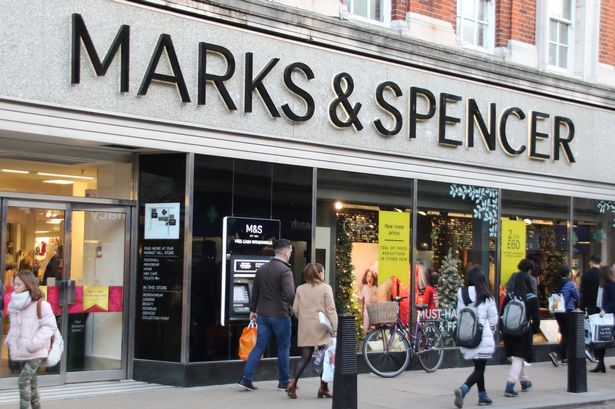
Marks & Spencer is cutting 7,000 jobs over the next three months across its stores and management.
It said the coronavirus pandemic had made it clear there had been a “material shift in trade”.
In-store sales of clothing and home goods were “well below” 2019, although online and home deliveries were strong.
M&S said it hoped a “significant proportion” of the cuts – about a tenth of its workforce – will be voluntary redundancy and early retirement.
In a statement, M&S said it was “too early to predict with precision where a new post-Covid sales mix will settle. We must now act to reflect this change”.
But the retailer said operating during the pandemic had showed it could work “more flexibly and productively”, with more staff multi-tasking and moving between food, clothing and home departments.
M&S said total sales in its hard-hit clothing and home arm plunged 29.9% in the eight weeks since shops reopened, with store sales tumbling 47.9% and online surging 39.2%.
In the last 13 weeks, food sales have increased by 2.5%.
At the height of lockdown, M&S boss Steve Rowe said customers might “never shop the same way again” after the coronavirus crisis.
And last month the retailer announced 950 store management and head office jobs were at risk because it needed to accelerate its restructuring.
Alongside Tuesday’s announcement of more job cuts Mr Rowe said: “In May we outlined our plans to learn from the crisis, accelerate our transformation and deliver a stronger, more agile business in a world in which some customer habits were changed forever.
“Three months on and our ‘Never the Same Again’ programme is progressing; albeit the outlook is uncertain and we remain cautious.
He said the proposals to “further streamline store operations and management” were an “important step in becoming a leaner, faster business set up to serve changing customer needs”.
Retail Economics chief executive Richard Lim said the cuts represented a “massive reduction” in the M&S workforce. The retailer was “desperately attempting to reposition the business towards a new-normal emerging in the sector”.
“Retailers were already battling with the pace of structural change facing the sector but the impact of the pandemic has been a step-change for the industry.”
He said retailers remained in “survival mode, preserving cash and hanging on for more sustainable levels of demand to return”.
“But the way we shop has changed on a permanent basis for many parts of the sector almost overnight.
“The reality is that many more retailers will fail and the number of job losses will ramp up as government support is withdrawn. This is the calm before the storm.”
Marks and Spencer has been in the throes of a big reorganisation of one sort or another for most of the past two decades.
Successive management teams have struggled to come to terms with rapid shifts in consumer behaviour – but none so rapid as what has happened over the past four months.
M&S had already begun what looked like it most serious restructuring in years before the pandemic struck, with a big drive to boost online sales – notably with a partnership with Ocado – and to close underperforming stores. But those plans, drawn up by Chairman Archie Norman and Chief Executive Steve Rowe, have been accelerated by the coronavirus.
The bigger question now is whether the drastic action now being taken is enough to cope not only with the sudden decline in sales brought about by the pandemic, but the longer-term shifts that have so vexed M&S management in the past.
The size of the job cuts suggests that M&S is at least taking those threats seriously.
M&S employs almost 78,000 people, most of them in the UK. The bulk of the latest job cuts are expected to come among shop floor workers, with about 12% of customer assistant roles going.
Cuts will also be made at head office and in regional management.
However, the company is shifting resources and recruiting towards areas that are expanding – online and food.
M&S has recently taken on 150 new staff in a new online warehouse at Castle Donington, and is looking to employ 360 people at a new food distribution centre in Milton Keynes.
